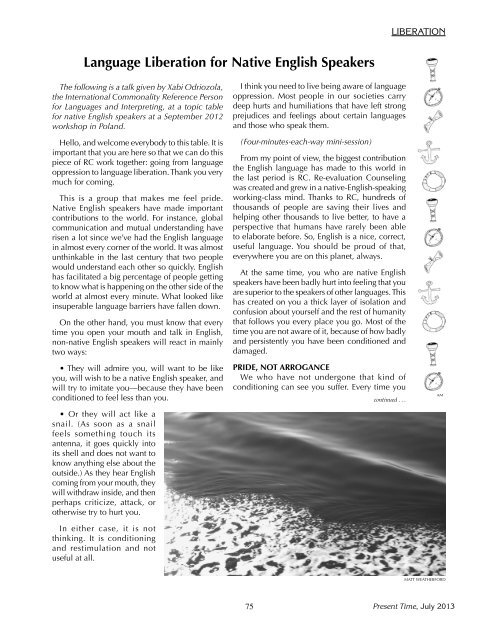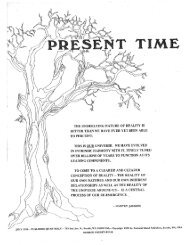Language Liberation for Native English Speakers - Re-evaluation ...
Language Liberation for Native English Speakers - Re-evaluation ...
Language Liberation for Native English Speakers - Re-evaluation ...
You also want an ePaper? Increase the reach of your titles
YUMPU automatically turns print PDFs into web optimized ePapers that Google loves.
LIBERATION<br />
<strong>Language</strong> <strong>Liberation</strong> <strong>for</strong> <strong>Native</strong> <strong>English</strong> <strong>Speakers</strong><br />
The following is a talk given by Xabi Odriozola,<br />
the International Commonality <strong>Re</strong>ference Person<br />
<strong>for</strong> <strong>Language</strong>s and Interpreting, at a topic table<br />
<strong>for</strong> native <strong>English</strong> speakers at a September 2012<br />
workshop in Poland.<br />
Hello, and welcome everybody to this table. It is<br />
important that you are here so that we can do this<br />
piece of RC work together: going from language<br />
oppression to language liberation. Thank you very<br />
much <strong>for</strong> coming.<br />
This is a group that makes me feel pride.<br />
<strong>Native</strong> <strong>English</strong> speakers have made important<br />
contributions to the world. For instance, global<br />
communication and mutual understanding have<br />
risen a lot since we’ve had the <strong>English</strong> language<br />
in almost every corner of the world. It was almost<br />
unthinkable in the last century that two people<br />
would understand each other so quickly. <strong>English</strong><br />
has facilitated a big percentage of people getting<br />
to know what is happening on the other side of the<br />
world at almost every minute. What looked like<br />
insuperable language barriers have fallen down.<br />
On the other hand, you must know that every<br />
time you open your mouth and talk in <strong>English</strong>,<br />
non-native <strong>English</strong> speakers will react in mainly<br />
two ways:<br />
• They will admire you, will want to be like<br />
you, will wish to be a native <strong>English</strong> speaker, and<br />
will try to imitate you—because they have been<br />
conditioned to feel less than you.<br />
• Or they will act like a<br />
snail. (As soon as a snail<br />
feels something touch its<br />
antenna, it goes quickly into<br />
its shell and does not want to<br />
know anything else about the<br />
outside.) As they hear <strong>English</strong><br />
coming from your mouth, they<br />
will withdraw inside, and then<br />
perhaps criticize, attack, or<br />
otherwise try to hurt you.<br />
In either case, it is not<br />
thinking. It is conditioning<br />
and restimulation and not<br />
useful at all.<br />
I think you need to live being aware of language<br />
oppression. Most people in our societies carry<br />
deep hurts and humiliations that have left strong<br />
prejudices and feelings about certain languages<br />
and those who speak them.<br />
(Four-minutes-each-way mini-session)<br />
From my point of view, the biggest contribution<br />
the <strong>English</strong> language has made to this world in<br />
the last period is RC. <strong>Re</strong>-<strong>evaluation</strong> Counseling<br />
was created and grew in a native-<strong>English</strong>-speaking<br />
working-class mind. Thanks to RC, hundreds of<br />
thousands of people are saving their lives and<br />
helping other thousands to live better, to have a<br />
perspective that humans have rarely been able<br />
to elaborate be<strong>for</strong>e. So, <strong>English</strong> is a nice, correct,<br />
useful language. You should be proud of that,<br />
everywhere you are on this planet, always.<br />
At the same time, you who are native <strong>English</strong><br />
speakers have been badly hurt into feeling that you<br />
are superior to the speakers of other languages. This<br />
has created on you a thick layer of isolation and<br />
confusion about yourself and the rest of humanity<br />
that follows you every place you go. Most of the<br />
time you are not aware of it, because of how badly<br />
and persistently you have been conditioned and<br />
damaged.<br />
PRIDE, NOT ARROGANCE<br />
We who have not undergone that kind of<br />
conditioning can see you suffer. Every time you<br />
continued . . .<br />
AM<br />
MATT WEATHERFORD<br />
75<br />
Present Time, July 2013
LIBERATION<br />
. . . continued<br />
oppress someone, you suffer along with that<br />
person. And we do not want you to suffer, or to<br />
have a limited life.<br />
We need you proud of yourself and at the same<br />
time not arrogant. That’s the balance you need to<br />
achieve. In the same way that you have taught us<br />
a lot of things, we can teach you something that<br />
will help you have a much better life. When you<br />
have a better life, our lives get better—and that’s<br />
nice.<br />
I will give you some ideas <strong>for</strong> how you can act<br />
proud in a non-arrogant way and “be in the second<br />
row” but not be passive or completely quiet.<br />
First, let’s have a second mini-session about what<br />
I said. (Mini-session)<br />
As you know, our Guidelines 1 require us to agree<br />
on only one point: that we will work together to<br />
free our minds from distress recordings and do<br />
that in a peer relationship. So, the interesting job<br />
<strong>for</strong> you native <strong>English</strong> speakers is to figure out the<br />
answer to this question:<br />
How can I be in an equal, peer relationship<br />
with someone who, as soon as she or he hears my<br />
voice, will feel inferior and become my unthinking<br />
follower and admirer or want to hurt me<br />
If you can find that<br />
safe place, that place of<br />
pride but not arrogance,<br />
you will know what to<br />
do. It’s a safe place <strong>for</strong><br />
everyone in the world. It’s<br />
a place that all of us nonnative<br />
<strong>English</strong> speakers<br />
are waiting <strong>for</strong>. We want<br />
to meet you in that place.<br />
There is a lot of work to<br />
do—from your side, and<br />
from our side—but that is<br />
the best thing we can do<br />
now. We were born to go<br />
to that place, that neutral<br />
place, in which you try a<br />
little to come to me and I<br />
try to come to you.<br />
1<br />
The Guidelines <strong>for</strong> the <strong>Re</strong><strong>evaluation</strong><br />
Counseling Communities—the<br />
policies <strong>for</strong> the RC<br />
Communities<br />
Let’s have another mini-session be<strong>for</strong>e going on.<br />
(Mini-session)<br />
Are you fine Is this very hard <strong>for</strong> you If it’s<br />
hard, I am sorry. But you are brave—I know you<br />
know you are.<br />
<strong>Native</strong> <strong>English</strong> speaker: It’s hard, but it’s similar<br />
to the work I have done on class: being proud but<br />
not arrogant.<br />
Yes, it is not easy. In fact, I have never known<br />
any liberation work that was easy. Coming from a<br />
Christian background, I could think of it as having<br />
heaven and hell together. That’s what liberation<br />
and life often can be like. Sometimes I am in<br />
heaven—which could be something similar to a<br />
non-distressed environment—and suddenly I find<br />
myself in hell—which could be the maximum<br />
expression of all kinds of distresses being acted<br />
out at the same time and in the same place. When<br />
I am in heaven, I feel happy, and I am afraid of<br />
going to hell. But I know that if I go to hell, it is<br />
as bad as it can get, there is nothing worse, and<br />
it will end sometime. And then I will go back to<br />
heaven again. I have learned to like being in hell<br />
sometimes, because, thanks to discharge, hell is not<br />
an unbearable thing or something “<strong>for</strong>ever,” and<br />
I always have the opportunity to learn something<br />
from it, to grow up, and to become smarter and<br />
stronger than be<strong>for</strong>e.<br />
THE NEUTRAL PLACE<br />
Okay, I would like to say a few things about how<br />
you can get to that neutral place in which every<br />
relationship can work well.<br />
Some of you are there already. I can see you.<br />
Some of you are not. All of you want to be there.<br />
Going to that neutral place is like everything you<br />
do in RC: be<strong>for</strong>e acting, you think. You have that<br />
capacity.<br />
You can think about the person you are going<br />
to meet—in the hall, in the bathroom, in the<br />
class—three seconds be<strong>for</strong>e meeting. Your mind<br />
can be working on, thinking about, that upcoming<br />
meeting, that person. You only need to discipline<br />
your mind.<br />
In three seconds, you can mentally scan that<br />
person: “Oh! She’s not a native <strong>English</strong> speaker. So<br />
which language is hers Who is she Where does<br />
she come from Can she speak <strong>English</strong>”<br />
BILL HORNE<br />
Present Time, July 2013 76
LIBERATION<br />
This simple ef<strong>for</strong>t (you trying to think about her)<br />
is going to change everything between you and her.<br />
The attitude of thinking<br />
about someone who<br />
may not speak your<br />
language is going to<br />
change your unaware<br />
perspective. Something<br />
will change in you—in<br />
your facial expression,<br />
your posture, your tone<br />
of voice, your gestures—<br />
and the person may<br />
feel, “This time you are<br />
trying to reach me, you are trying to see me, and<br />
it pushes me to feel like I want to meet you and<br />
not just be your enemy.”<br />
If you do not stop yourself and take three<br />
seconds to think about the person you are about<br />
to meet, if your language arrives be<strong>for</strong>e you do,<br />
if your arrogance arrives be<strong>for</strong>e your mind and<br />
your love, that person will be like the snail whose<br />
antenna has been touched and will go inside her<br />
shell.<br />
BEING SECOND, YES,<br />
BUT NOT PASSIVE OR QUIET<br />
There are a lot of ways you can think about nonnative<br />
<strong>English</strong> speakers. One is very simple and a<br />
big challenge: let them speak the first word.<br />
You need to be active in the relationship, but not<br />
by being first. You can be active by being second<br />
and thinking about what is going<br />
on 2 between the two of you. Being<br />
secondarily active is the best way to<br />
learn from the person in order not to<br />
step on him.<br />
You can also learn one word of that<br />
person’s language and try to speak<br />
it. If you do, some closed doors will<br />
open and the relationship will go<br />
in directions that you didn’t expect<br />
and that will be liberating <strong>for</strong> you<br />
and <strong>for</strong> him.<br />
If you want to try this last idea,<br />
please remember not to become<br />
a client while you are trying the<br />
person’s language; that may be<br />
oppressive.<br />
How can I be in an equal, peer<br />
relationship with someone who, as<br />
soon as she or he hears my voice,<br />
will feel inferior and become my<br />
unthinking follower and admirer or<br />
want to hurt me<br />
Last two-minutes-each to discharge and think<br />
about this. (Mini-session)<br />
THE OPPRESSORS´<br />
NOISE<br />
Another thing you can<br />
do is check your noise.<br />
People in the oppressor<br />
role are afraid of the<br />
people they oppress.<br />
O p p r e s s o r s h a t e<br />
oppressing people;<br />
it goes against their<br />
humanness. So if they<br />
are going to oppress<br />
someone, they make a lot of noise so that they<br />
cannot hear or see how the oppressed person is<br />
suffering.<br />
For me, as an Indigenous person, the volume of<br />
your <strong>English</strong> is like the volume of a little bomb or<br />
a shot. It’s not a peaceful volume. It’s like a noise<br />
from someone who is afraid to have equal human<br />
contact and prefers to avoid it, someone who<br />
prefers that we be separate and not united, because<br />
he does not know how to establish the relationship.<br />
It sometimes sounds like the enemy´s sound—not<br />
because you are the enemy, but because the noise<br />
is saying, “I do not dare to be with you. I do not<br />
dare to stand up in front of you so that you can see<br />
all my ugly stuff. I prefer to ignore you. It would be<br />
easier if you disappeared right now.” Other times it<br />
continued . . .<br />
2<br />
“Going on” means happening.<br />
ISRAEL • RANDI FREUNDLICH<br />
77<br />
Present Time, July 2013
LIBERATION<br />
. . . continued<br />
sounds like, “You are less than I, and I don’t want<br />
you in my way.”<br />
Your high volume pushes people away from<br />
the neutral-equal space, from the way to be with<br />
you. You can think about your volume. It’s a nice<br />
thing: how you laugh, how you clap. But your joy<br />
and happiness are heard more than some other<br />
people’s.<br />
We are here at this table today, hearing all this,<br />
so we are doing very well.<br />
FEAR OF MISTAKES<br />
Something that can freeze you and keep you<br />
from playing an active secondary role is how<br />
afraid you (we) are of making mistakes. Making<br />
a mistake can feel terrible. But if you realize you<br />
have messed up with someone because of your<br />
language attitude, that is a victory, then we are<br />
winning. That is the first step. Congratulations!<br />
The second step—as you know, and as Harvey 3<br />
would say—is to go to the person, apologize, and<br />
clean up the mess.<br />
You may feel stupid because of your mistake<br />
and because you are trying to apologize, but<br />
do not discharge with the person while you are<br />
3<br />
Harvey Jackins<br />
apologizing. Just apologize, and then go to<br />
someone else from your constituency and<br />
discharge.<br />
Then try to make contact again with the<br />
same person, or with another person who is<br />
not from your group. Try the same thing you<br />
were trying to do. Do not give up. Not giving<br />
up is more important than doing it well.<br />
How to apologize Try to apologize in the<br />
person’s language. You can learn the words<br />
<strong>for</strong> “excuse me” or ask someone who speaks<br />
that language to teach you how to say, “I<br />
made a mistake with you, and I will try not<br />
to do it again.” You can read it to the person<br />
you are apologizing to and afterward offer<br />
to listen <strong>for</strong> a couple of minutes about what<br />
you just said. There are many opportunities<br />
to make the snail come out of its shell, which<br />
is one of the most beautiful things you can<br />
experience.<br />
DIFFERENCES AMONG YOU TOO<br />
You also need to take into account the<br />
many differences among native <strong>English</strong><br />
speakers and how native <strong>English</strong> speakers<br />
oppress each other. For instance, owningclass<br />
people oppress middle- and workingclass<br />
people, men oppress women. In the<br />
United States, rural people<br />
speak differently than city<br />
people and will often be<br />
oppressed by them. It depends<br />
which country you come from;<br />
which part of the country you<br />
belong to (south, west, north,<br />
east, countryside, seaside, city,<br />
town); your class background,<br />
age, sex, race—you will have<br />
more of this, or less of that—<br />
but you will always have<br />
some kind of domination and<br />
competition to work on. The<br />
oppressive system is always<br />
using some kind of difference<br />
to get you to oppress each<br />
other and avoid unity. It is<br />
something you need to check.<br />
The more united you are, the<br />
less you oppress.<br />
ELLIE PUTNAM<br />
Present Time, July 2013 78
LIBERATION<br />
FREEING YOURSELF AS YOU<br />
END THE OPPRESSION<br />
You need to learn about your own culture and<br />
the other cultures around you, including those<br />
that were there be<strong>for</strong>e yours. This will give you<br />
keys to your liberation. Be proud of your culture<br />
as it is today—and at the same time improve it<br />
<strong>for</strong>ward, always.<br />
You don’t have to give up your intelligence; you<br />
only have to give up acting on your patterns, and<br />
that is something you really want to do.<br />
It’s a big opportunity to free yourself. Every place<br />
you go in life is soaked in language oppression and<br />
saturated with other oppressions. Any piece you<br />
choose is a good piece to work on. From my point<br />
of view, your being here and having the courage to<br />
listen to me and work on what I propose is a hero´s<br />
work. I see you as heroes at this workshop. From<br />
now on, the pace of this workshop, its rhythm,<br />
will be completely different—thanks to each and<br />
every one of you.<br />
It is hopeful to think that you may understand<br />
these ideas and be the messengers of them to your<br />
people. So, from the bottom of my heart, thank you<br />
very much <strong>for</strong> listening. Eskerrik asko. 4<br />
<strong>Re</strong>member that all the languages are just fine,<br />
completely right, and the fruit of thousands and<br />
thousands of years of human intelligent thinking.<br />
<strong>Language</strong> is not the problem. The problem is<br />
our behavior around language. <strong>Language</strong> is the<br />
solution.<br />
Xabi Odriozola<br />
Donostia-Gipuzkoa, Basque Country<br />
4<br />
“Eskerrik asko” means “thank you” in Basque.<br />
Innovation requires a good idea, initiative, and a few friends.<br />
Herbert A. Shepard<br />
Working Together<br />
to End Racism<br />
A pamphlet introducing<br />
RC from the perspective<br />
of ending racism<br />
$2.00 (U.S.), plus postage<br />
and handling<br />
Ordering in<strong>for</strong>mation<br />
on page 110<br />
MONNIE PAASHUIS<br />
79<br />
Present Time, July 2013










